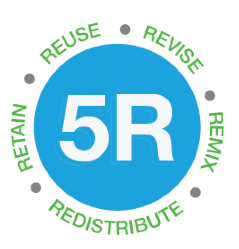1 What is OER?
Open Educational Resources (OER) are teaching, learning, and research materials that are either (a) in the public domain or (b) licensed in a manner that provides everyone with free and perpetual permission to engage in the 5R activities.
- Revise – edit, adapt, and modify your copy of the resource
- Remix – combine your original or revised copy of the resource with other existing material to create something new
- Retain – make, own, and control a copy of the resource
- Reuse – use your original, revised, or remixed copy of the resource publicly
- Redistribute – share copies of your original, revised, or remixed copy of the resource with others

From Open Oregon on the 5 Rs of OER:
Copyright License v. Creative Commons License
- Copyright is a right afforded to you by the U.S. Constitution, Article I, Section 8, Clause 8: Patent and Copyright Clause of the Constitution. [The Congress shall have power] “To promote the progress of science and useful arts, by securing for limited times to authors and inventors the exclusive right to their respective writings and discoveries.”
- Creative Commons is a nonprofit organization that helps overcome legal obstacles to the sharing of knowledge and creativity to address the world’s pressing challenges. Creative Commons licenses allow collaboration on your copyright with your permission.
Conditions of License
| Attribution | BY |
Credit must be given to the creator |
| Share Alike | SA |
Adaptations must be shared under the same terms |
| Non-commercial | NC |
Only non-commercial uses of the work are permitted |
| No Derivatives | ND |
No derivatives or adaptations of the work are permitted |
How to add a Creative Commons License to your work
*If you do not want to share your work, don’t put a Creative Commons license on it!
Adapted from “Open Education” by Creative Commons and licensed under a CC BY 4.0.
Icons by The Noun Project.


